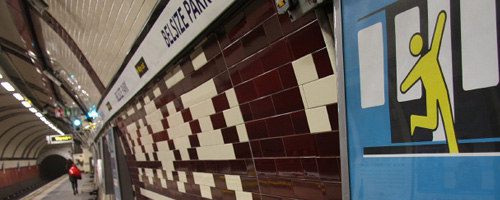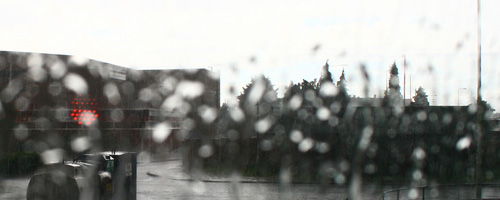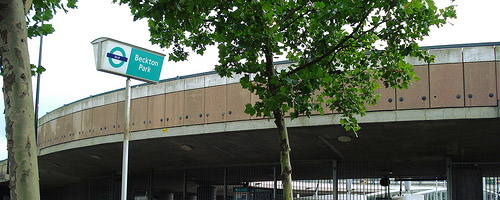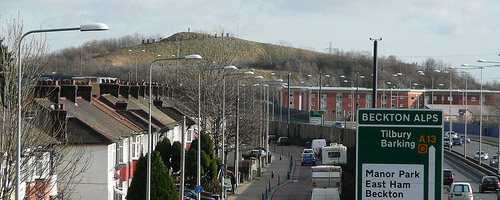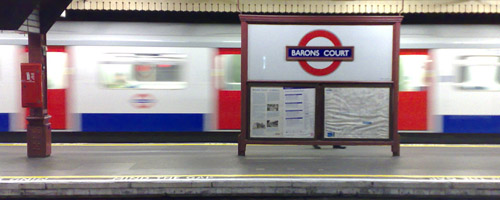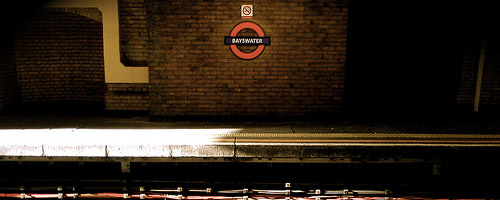
Picture by jonrawlinson: bayswater train station
The carriage empties at Victoria and Johann stands up again, walks to one end and then back. He takes hold of a pole, spare hand grasping in the air for something to catch onto.
Talbot leans back in his seat and sips from the lid of his thermos. “You know,” he says, “vampirism isn’t the, ha, undeath sentence it used to be. It’s true that there isn’t a cure, but what the popular media doesn’t understand is that ‘no cure’ isn’t the same as ‘no effective treatment’. There’s no cure for diabetes either, but it’s a long time since it was a major killer. These days the most serious symptoms can be suppressed indefinitely, with the proper medication — you won’t lust for human blood, you won’t turn to dust in the sunlight. You won’t even have to give up garlic bread.” He smiles broadly; his teeth are yellow.
“But the reflections,” Johann says. He can’t bear to look at the windows and see the empty space looking back.
Talbot nods acknowledgement. “Yes,” he says, “it’s true that there’s still no treatment for the reflections. Not too bad for an old man like me, but it’s going to be hard for you.”
“And cameras?” Johann feels like he’s gone pale, and paler still with the fear of never seeing himself blanch again.
“Same thing, I’m afraid.”
“But I’m an actor.”
Talbot shrugs. “There are three vampires in the RSC,” he says.
“Theatre,” Johann spits out. “What else are you going to suggest — radio? Dead media for a dead man?”
Talbot pours a little more coffee, rocking gently. “Undead,” he says. “And it’s not the only recourse.”
Johann’s sob is half laughter. He remembers Puppet Pam. You can be the nation’s best-loved soap star, and viewers still won’t stand for it when you turn invisible to the cameras and start to use a marionette instead of a body.
“Things have come on a long way since then,” Talbot says. “Puppet Pam had to drink fresh pigs’ blood, don’t forget; absurd, in this nation of meat-eaters, but it turned people against her. We’re past all that now, and computer generated images are good these days. Better than you probably imagine. Not just motion-tracking: every movement of your face, if you slap on a good enough sensor mask.” He takes another sip. “You’ve heard the rumours about deliberate infection?”
“Criminals who want to be CCTV-safe,” Johann says. “Teenagers in black lace.”
“Not exclusively.” Talbot swallows the last of the coffee in a gulp, then screws the lid back on and stands up without a pole, balancing himself against the motion of the train. “Think about who else wants to stay away from cameras, who can’t go down the shops without paparrazzi spotting chocolate biscuits in the shopping basket and pasting SLOB CELEB headlines over the free papers. Think about whose unblemished face on television screens is almost eerily smooth. Think about who will go to any lengths to keep their acne scars and pock marks out of public view, now that HDTV wants to reveal them to the world.”
Johann’s silent, then: “Someone would know. Someone would have said. The paparazzi…”
“Would what? Wave around a picture of a basket floating in the air and say no really, when we took the picture there was someone famous there, please believe me? They’ve done it, Johann, but the editors say nah, it’s some random vampire shopper being victimised, it’s a basket suspended by fishing line, and even if it isn’t how do you photograph someone’s inability to be photographed?” Talbot steps towards Johann and lowers his voice. “And they don’t want to spread the rumour for its own sake. It might give their other targets ideas. Come on, I’ve got something to show you.”
“I just want to go home,” Johann says.
“Shush.” Talbot takes his arm and pulls hard, and they stumble onto the platform. “Up here.”
BAYSWATER, the sign says. Johann wrenches his arm free.
“Listen,” Talbot says, turning to face him. “There’s two houses up there with no rooms, no roof, just the facade, walls and doors and windows sitting there to make sure nobody can see the trainline behind them.”
Johann’s crying now; someone edges away down the platform.
“It’s all right,” Talbot says quietly. “I know it’s hard, but Johann, it’s all right. They know about appearances, here. They know about gloss and surface and sensor masks and everything you could ever want, and I promise it’s going to be all right. There’s a lot of expensive buildings in Bayswater, but there’s not many of those big plate glass windows that reflect the whole street, are there? There’s a reason for that. I’ll show you.”
He reaches out and takes Johann’s arm again. Johann hesitates for a moment, then lets himself be guided upward, slowly, toward the vampire capital of Europe.
